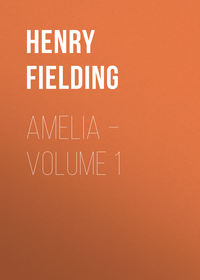 полная версия
полная версияHistory of Tom Jones, a Foundling
“Well, but consider,” cried George, “what answer shall I make to madam?”
“I don’t know what answer,” says she; “you are always bringing your family into one quandary or other. Do you remember when you shot the partridge, the occasion of all our misfortunes? Did not I advise you never to go into Squire Western’s manor? Did not I tell you many a good year ago what would come of it? But you would have your own headstrong ways; yes, you would, you villain.”
Black George was, in the main, a peaceable kind of fellow, and nothing choleric nor rash; yet did he bear about him something of what the antients called the irascible, and which his wife, if she had been endowed with much wisdom, would have feared. He had long experienced, that when the storm grew very high, arguments were but wind, which served rather to increase, than to abate it. He was therefore seldom unprovided with a small switch, a remedy of wonderful force, as he had often essayed, and which the word villain served as a hint for his applying.
No sooner, therefore, had this symptom appeared, than he had immediate recourse to the said remedy, which though, as it is usual in all very efficacious medicines, it at first seemed to heighten and inflame the disease, soon produced a total calm, and restored the patient to perfect ease and tranquillity.
This is, however, a kind of horse-medicine, which requires a very robust constitution to digest, and is therefore proper only for the vulgar, unless in one single instance, viz., where superiority of birth breaks out; in which case, we should not think it very improperly applied by any husband whatever, if the application was not in itself so base, that, like certain applications of the physical kind which need not be mentioned, it so much degrades and contaminates the hand employed in it, that no gentleman should endure the thought of anything so low and detestable.
The whole family were soon reduced to a state of perfect quiet; for the virtue of this medicine, like that of electricity, is often communicated through one person to many others, who are not touched by the instrument. To say the truth, as they both operate by friction, it may be doubted whether there is not something analogous between them, of which Mr Freke would do well to enquire, before he publishes the next edition of his book.
A council was now called, in which, after many debates, Molly still persisting that she would not go to service, it was at length resolved, that Goody Seagrim herself should wait on Miss Western, and endeavour to procure the place for her eldest daughter, who declared great readiness to accept it: but Fortune, who seems to have been an enemy of this little family, afterwards put a stop to her promotion.
Chapter x. – A story told by Mr Supple, the curate. The penetration of Squire Western. His great love for his daughter, and the return to it made by her
The next morning Tom Jones hunted with Mr Western, and was at his return invited by that gentleman to dinner.
The lovely Sophia shone forth that day with more gaiety and sprightliness than usual. Her battery was certainly levelled at our heroe; though, I believe, she herself scarce yet knew her own intention; but if she had any design of charming him, she now succeeded.
Mr Supple, the curate of Mr Allworthy’s parish, made one of the company. He was a good-natured worthy man; but chiefly remarkable for his great taciturnity at table, though his mouth was never shut at it. In short, he had one of the best appetites in the world. However, the cloth was no sooner taken away, than he always made sufficient amends for his silence: for he was a very hearty fellow; and his conversation was often entertaining, never offensive.
At his first arrival, which was immediately before the entrance of the roast-beef, he had given an intimation that he had brought some news with him, and was beginning to tell, that he came that moment from Mr Allworthy’s, when the sight of the roast-beef struck him dumb, permitting him only to say grace, and to declare he must pay his respect to the baronet, for so he called the sirloin.
When dinner was over, being reminded by Sophia of his news, he began as follows: “I believe, lady, your ladyship observed a young woman at church yesterday at even-song, who was drest in one of your outlandish garments; I think I have seen your ladyship in such a one. However, in the country, such dresses are
Rara avis in terris, nigroque simillima cygno.
That is, madam, as much as to say, ‘A rare bird upon the earth, and very like a black swan.’ The verse is in Juvenal. But to return to what I was relating. I was saying such garments are rare sights in the country; and perchance, too, it was thought the more rare, respect being had to the person who wore it, who, they tell me, is the daughter of Black George, your worship’s gamekeeper, whose sufferings, I should have opined, might have taught him more wit, than to dress forth his wenches in such gaudy apparel. She created so much confusion in the congregation, that if Squire Allworthy had not silenced it, it would have interrupted the service: for I was once about to stop in the middle of the first lesson. Howbeit, nevertheless, after prayer was over, and I was departed home, this occasioned a battle in the churchyard, where, amongst other mischief, the head of a travelling fidler was very much broken. This morning the fidler came to Squire Allworthy for a warrant, and the wench was brought before him. The squire was inclined to have compounded matters; when, lo! on a sudden the wench appeared (I ask your ladyship’s pardon) to be, as it were, at the eve of bringing forth a bastard. The squire demanded of her who was the father? But she pertinaciously refused to make any response. So that he was about to make her mittimus to Bridewell when I departed.”
“And is a wench having a bastard all your news, doctor?” cries Western; “I thought it might have been some public matter, something about the nation.”
“I am afraid it is too common, indeed,” answered the parson; “but I thought the whole story altogether deserved commemorating. As to national matters, your worship knows them best. My concerns extend no farther than my own parish.”
“Why, ay,” says the squire, “I believe I do know a little of that matter, as you say. But, come, Tommy, drink about; the bottle stands with you.”
Tom begged to be excused, for that he had particular business; and getting up from table, escaped the clutches of the squire, who was rising to stop him, and went off with very little ceremony.
The squire gave him a good curse at his departure; and then turning to the parson, he cried out, “I smoke it: I smoke it. Tom is certainly the father of this bastard. Zooks, parson, you remember how he recommended the veather o’ her to me. D – n un, what a sly b – ch ‘tis. Ay, ay, as sure as two-pence, Tom is the veather of the bastard.”
“I should be very sorry for that,” says the parson.
“Why sorry,” cries the squire: “Where is the mighty matter o’t? What, I suppose dost pretend that thee hast never got a bastard? Pox! more good luck’s thine? for I warrant hast a done a therefore many’s the good time and often.”
“Your worship is pleased to be jocular,” answered the parson; “but I do not only animadvert on the sinfulness of the action – though that surely is to be greatly deprecated – but I fear his unrighteousness may injure him with Mr Allworthy. And truly I must say, though he hath the character of being a little wild, I never saw any harm in the young man; nor can I say I have heard any, save what your worship now mentions. I wish, indeed, he was a little more regular in his responses at church; but altogether he seems
Ingenui vultus puer ingenuique pudoris.
That is a classical line, young lady; and, being rendered into English, is, `a lad of an ingenuous countenance, and of an ingenuous modesty;’ for this was a virtue in great repute both among the Latins and Greeks. I must say, the young gentleman (for so I think I may call him, notwithstanding his birth) appears to me a very modest, civil lad, and I should be sorry that he should do himself any injury in Squire Allworthy’s opinion.”
“Poogh!” says the squire: “Injury, with Allworthy! Why, Allworthy loves a wench himself. Doth not all the country know whose son Tom is? You must talk to another person in that manner. I remember Allworthy at college.”
“I thought,” said the parson, “he had never been at the university.”
“Yes, yes, he was,” says the squire: “and many a wench have we two had together. As arrant a whore-master as any within five miles o’un. No, no. It will do’n no harm with he, assure yourself; nor with anybody else. Ask Sophy there – You have not the worse opinion of a young fellow for getting a bastard, have you, girl? No, no, the women will like un the better for’t.”
This was a cruel question to poor Sophia. She had observed Tom’s colour change at the parson’s story; and that, with his hasty and abrupt departure, gave her sufficient reason to think her father’s suspicion not groundless. Her heart now at once discovered the great secret to her which it had been so long disclosing by little and little; and she found herself highly interested in this matter. In such a situation, her father’s malapert question rushing suddenly upon her, produced some symptoms which might have alarmed a suspicious heart; but, to do the squire justice, that was not his fault. When she rose therefore from her chair, and told him a hint from him was always sufficient to make her withdraw, he suffered her to leave the room, and then with great gravity of countenance remarked, “That it was better to see a daughter over-modest than over-forward;” – a sentiment which was highly applauded by the parson.
There now ensued between the squire and the parson a most excellent political discourse, framed out of newspapers and political pamphlets; in which they made a libation of four bottles of wine to the good of their country: and then, the squire being fast asleep, the parson lighted his pipe, mounted his horse, and rode home.
When the squire had finished his half-hour’s nap, he summoned his daughter to her harpsichord; but she begged to be excused that evening, on account of a violent head-ache. This remission was presently granted; for indeed she seldom had occasion to ask him twice, as he loved her with such ardent affection, that, by gratifying her, he commonly conveyed the highest gratification to himself. She was really, what he frequently called her, his little darling, and she well deserved to be so; for she returned all his affection in the most ample manner. She had preserved the most inviolable duty to him in all things; and this her love made not only easy, but so delightful, that when one of her companions laughed at her for placing so much merit in such scrupulous obedience, as that young lady called it, Sophia answered, “You mistake me, madam, if you think I value myself upon this account; for besides that I am barely discharging my duty, I am likewise pleasing myself. I can truly say I have no delight equal to that of contributing to my father’s happiness; and if I value myself, my dear, it is on having this power, and not on executing it.”
This was a satisfaction, however, which poor Sophia was incapable of tasting this evening. She therefore not only desired to be excused from her attendance at the harpsichord, but likewise begged that he would suffer her to absent herself from supper. To this request likewise the squire agreed, though not without some reluctance; for he scarce ever permitted her to be out of his sight, unless when he was engaged with his horses, dogs, or bottle. Nevertheless he yielded to the desire of his daughter, though the poor man was at the same time obliged to avoid his own company (if I may so express myself), by sending for a neighbouring farmer to sit with him.
Chapter xi. – The narrow escape of Molly Seagrim, with some observations for which we have been forced to dive pretty deep into nature
Tom Jones had ridden one of Mr Western’s horses that morning in the chase; so that having no horse of his own in the squire’s stable, he was obliged to go home on foot: this he did so expeditiously that he ran upwards of three miles within the half-hour.
Just as he arrived at Mr Allworthy’s outward gate, he met the constable and company with Molly in their possession, whom they were conducting to that house where the inferior sort of people may learn one good lesson, viz., respect and deference to their superiors; since it must show them the wide distinction Fortune intends between those persons who are to be corrected for their faults, and those who are not; which lesson if they do not learn, I am afraid they very rarely learn any other good lesson, or improve their morals, at the house of correction.
A lawyer may perhaps think Mr Allworthy exceeded his authority a little in this instance. And, to say the truth, I question, as here was no regular information before him, whether his conduct was strictly regular. However, as his intention was truly upright, he ought to be excused in foro conscientiae; since so many arbitrary acts are daily committed by magistrates who have not this excuse to plead for themselves.
Tom was no sooner informed by the constable whither they were proceeding (indeed he pretty well guessed it of himself), than he caught Molly in his arms, and embracing her tenderly before them all, swore he would murder the first man who offered to lay hold of her. He bid her dry her eyes and be comforted; for, wherever she went, he would accompany her. Then turning to the constable, who stood trembling with his hat off, he desired him, in a very mild voice, to return with him for a moment only to his father (for so he now called Allworthy); for he durst, he said, be assured, that, when he had alledged what he had to say in her favour, the girl would be discharged.
The constable, who, I make no doubt, would have surrendered his prisoner had Tom demanded her, very readily consented to this request. So back they all went into Mr Allworthy’s hall; where Tom desired them to stay till his return, and then went himself in pursuit of the good man. As soon as he was found, Tom threw himself at his feet, and having begged a patient hearing, confessed himself to be the father of the child of which Molly was then big. He entreated him to have compassion on the poor girl, and to consider, if there was any guilt in the case, it lay principally at his door.
“If there is any guilt in the case!” answered Allworthy warmly: “Are you then so profligate and abandoned a libertine to doubt whether the breaking the laws of God and man, the corrupting and ruining a poor girl be guilt? I own, indeed, it doth lie principally upon you; and so heavy it is, that you ought to expect it should crush you.”
“Whatever may be my fate,” says Tom, “let me succeed in my intercessions for the poor girl. I confess I have corrupted her! but whether she shall be ruined, depends on you. For Heaven’s sake, sir, revoke your warrant, and do not send her to a place which must unavoidably prove her destruction.”
Allworthy bid him immediately call a servant. Tom answered there was no occasion; for he had luckily met them at the gate, and relying upon his goodness, had brought them all back into his hall, where they now waited his final resolution, which upon his knees he besought him might be in favour of the girl; that she might be permitted to go home to her parents, and not be exposed to a greater degree of shame and scorn than must necessarily fall upon her. “I know,” said he, “that is too much. I know I am the wicked occasion of it. I will endeavour to make amends, if possible; and if you shall have hereafter the goodness to forgive me, I hope I shall deserve it.”
Allworthy hesitated some time, and at last said, “Well, I will discharge my mittimus. – You may send the constable to me.” He was instantly called, discharged, and so was the girl.
It will be believed that Mr Allworthy failed not to read Tom a very severe lecture on this occasion; but it is unnecessary to insert it here, as we have faithfully transcribed what he said to Jenny Jones in the first book, most of which may be applied to the men, equally with the women. So sensible an effect had these reproofs on the young man, who was no hardened sinner, that he retired to his own room, where he passed the evening alone, in much melancholy contemplation.
Allworthy was sufficiently offended by this transgression of Jones; for notwithstanding the assertions of Mr Western, it is certain this worthy man had never indulged himself in any loose pleasures with women, and greatly condemned the vice of incontinence in others. Indeed, there is much reason to imagine that there was not the least truth in what Mr Western affirmed, especially as he laid the scene of those impurities at the university, where Mr Allworthy had never been. In fact, the good squire was a little too apt to indulge that kind of pleasantry which is generally called rhodomontade: but which may, with as much propriety, be expressed by a much shorter word; and perhaps we too often supply the use of this little monosyllable by others; since very much of what frequently passes in the world for wit and humour, should, in the strictest purity of language, receive that short appellation, which, in conformity to the well-bred laws of custom, I here suppress.
But whatever detestation Mr Allworthy had to this or to any other vice, he was not so blinded by it but that he could discern any virtue in the guilty person, as clearly indeed as if there had been no mixture of vice in the same character. While he was angry therefore with the incontinence of Jones, he was no less pleased with the honour and honesty of his self-accusation. He began now to form in his mind the same opinion of this young fellow, which, we hope, our reader may have conceived. And in balancing his faults with his perfections, the latter seemed rather to preponderate.
It was to no purpose, therefore, that Thwackum, who was immediately charged by Mr Blifil with the story, unbended all his rancour against poor Tom. Allworthy gave a patient hearing to their invectives, and then answered coldly: “That young men of Tom’s complexion were too generally addicted to this vice; but he believed that youth was sincerely affected with what he had said to him on the occasion, and he hoped he would not transgress again.” So that, as the days of whipping were at an end, the tutor had no other vent but his own mouth for his gall, the usual poor resource of impotent revenge.
But Square, who was a less violent, was a much more artful man; and as he hated Jones more perhaps than Thwackum himself did, so he contrived to do him more mischief in the mind of Mr Allworthy.
The reader must remember the several little incidents of the partridge, the horse, and the Bible, which were recounted in the second book. By all which Jones had rather improved than injured the affection which Mr Allworthy was inclined to entertain for him. The same, I believe, must have happened to him with every other person who hath any idea of friendship, generosity, and greatness of spirit, that is to say, who hath any traces of goodness in his mind.
Square himself was not unacquainted with the true impression which those several instances of goodness had made on the excellent heart of Allworthy; for the philosopher very well knew what virtue was, though he was not always perhaps steady in its pursuit; but as for Thwackum, from what reason I will not determine, no such thoughts ever entered into his head: he saw Jones in a bad light, and he imagined Allworthy saw him in the same, but that he was resolved, from pride and stubbornness of spirit, not to give up the boy whom he had once cherished; since by so doing, he must tacitly acknowledge that his former opinion of him had been wrong.
Square therefore embraced this opportunity of injuring Jones in the tenderest part, by giving a very bad turn to all these before-mentioned occurrences. “I am sorry, sir,” said he, “to own I have been deceived as well as yourself. I could not, I confess, help being pleased with what I ascribed to the motive of friendship, though it was carried to an excess, and all excess is faulty and vicious: but in this I made allowance for youth. Little did I suspect that the sacrifice of truth, which we both imagined to have been made to friendship, was in reality a prostitution of it to a depraved and debauched appetite. You now plainly see whence all the seeming generosity of this young man to the family of the gamekeeper proceeded. He supported the father in order to corrupt the daughter, and preserved the family from starving, to bring one of them to shame and ruin. This is friendship! this is generosity! As Sir Richard Steele says, `Gluttons who give high prices for delicacies, are very worthy to be called generous.’ In short I am resolved, from this instance, never to give way to the weakness of human nature more, nor to think anything virtue which doth not exactly quadrate with the unerring rule of right.”
The goodness of Allworthy had prevented those considerations from occurring to himself; yet were they too plausible to be absolutely and hastily rejected, when laid before his eyes by another. Indeed what Square had said sunk very deeply into his mind, and the uneasiness which it there created was very visible to the other; though the good man would not acknowledge this, but made a very slight answer, and forcibly drove off the discourse to some other subject. It was well perhaps for poor Tom, that no such suggestions had been made before he was pardoned; for they certainly stamped in the mind of Allworthy the first bad impression concerning Jones.
Chapter xii. – Containing much clearer matters; but which flowed from the same fountain with those in the preceding chapter
The reader will be pleased, I believe, to return with me to Sophia. She passed the night, after we saw her last, in no very agreeable manner. Sleep befriended her but little, and dreams less. In the morning, when Mrs Honour, her maid, attended her at the usual hour, she was found already up and drest.
Persons who live two or three miles’ distance in the country are considered as next-door neighbours, and transactions at the one house fly with incredible celerity to the other. Mrs Honour, therefore, had heard the whole story of Molly’s shame; which she, being of a very communicative temper, had no sooner entered the apartment of her mistress, than she began to relate in the following manner: —
“La, ma’am, what doth your la’ship think? the girl that your la’ship saw at church on Sunday, whom you thought so handsome; though you would not have thought her so handsome neither, if you had seen her nearer, but to be sure she hath been carried before the justice for being big with child. She seemed to me to look like a confident slut: and to be sure she hath laid the child to young Mr Jones. And all the parish says Mr Allworthy is so angry with young Mr Jones, that he won’t see him. To be sure, one can’t help pitying the poor young man, and yet he doth not deserve much pity neither, for demeaning himself with such kind of trumpery. Yet he is so pretty a gentleman, I should be sorry to have him turned out of doors. I dares to swear the wench was as willing as he; for she was always a forward kind of body. And when wenches are so coming, young men are not so much to be blamed neither; for to be sure they do no more than what is natural. Indeed it is beneath them to meddle with such dirty draggle-tails; and whatever happens to them, it is good enough for them. And yet, to be sure, the vile baggages are most in fault. I wishes, with all my heart, they were well to be whipped at the cart’s tail; for it is pity they should be the ruin of a pretty young gentleman; and nobody can deny but that Mr Jones is one of the most handsomest young men that ever – ”
She was running on thus, when Sophia, with a more peevish voice than she had ever spoken to her in before, cried, “Prithee, why dost thou trouble me with all this stuff? What concern have I in what Mr Jones doth? I suppose you are all alike. And you seem to me to be angry it was not your own case.”
“I, ma’am!” answered Mrs Honour, “I am sorry your ladyship should have such an opinion of me. I am sure nobody can say any such thing of me. All the young fellows in the world may go to the divil for me. Because I said he was a handsome man? Everybody says it as well as I. To be sure, I never thought as it was any harm to say a young man was handsome; but to be sure I shall never think him so any more now; for handsome is that handsome does. A beggar wench! – ”









